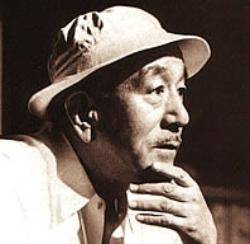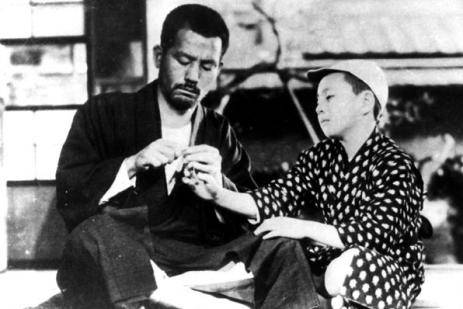To meet in France one of the most important filmmakers in Hong Kong cinema is an occasion that no one should spoil. This year, The Paris International Encounters of Cinema gave us such a chance, when they invited this famous figure. Together with the invitation to discuss with Stanley Kwan the festival provided an opportunity to discover as well works well know, like Rouge and Center Stage, as less well known like Lan Yu or Hold You Tight, and even his documentary Yang-Yin about "sex-confusion in Chinese cinema".
It was under the sign of affability and exchange (which both are very common in the International Encounters) that was led our interview with Stanley Kwan.
|
|
An inventive and sad filmmaker, well known through various international festivals, Kwan has shared with us, honestly, his needs, his passions, and his cinematic influences.
Such an exchange has deeply confirmed our feeling that this artist of deep convictions is surely, between all chinese cinema personalities, one of whose films, like him, are rich in seeing again.
|

|
| introduction to stanley kwan |
 HKCinemagic :
How did your passion for cinema appear, and how did you become a director? HKCinemagic :
How did your passion for cinema appear, and how did you become a director?
|
Stanley Kwan : When I was a kid, there was a movie theater next door to us. I went often there to see films. In the beginning, it was Cantonese movies, filmed operas, mélos. Then there has been action films, chivalry films of the Shaw Brothers. Later, I also saw Hollywood films, big shows like Ben Hur [William Wyler, 1959] or The Sound of Music [Robert Wise, 1965]. My parents thought that the movie-theater was a waste of time and of money, and that it could slow down my studies. They did not like my passion. They often scolded me, and even punished me. But I continued to go there. The little pocket money that I had, I spared it to pay my meetings. To satisfy my passion, I had to give up other little childish pleasures such as candies or small toys.
Later, when I began studying journalism and communication sciences, I had access to other types of film, like the French New Wave movies, or Japanese movies. At that time, I didn‘t even dream of becoming a director. It was something unthinkable for me. I went to see Yasujiro Ozu's movies, or Francois Truffaut's as you go on pilgrimage. I dared not put myself in the shoes of these geniuses.
I had some vague desire to be an actor. In the middle of the 1970s, I applied to the drama court in the TVB chain [In Hong Kong, TVB and ATV channels each possess, since their beginning, a training center for actors. After graduation, the best students are taken under contract by the chain. Stars like Chow Yun Fat, Tony Leung Chiu Wai or Andy Lau come from the famous "nursery" of the TVB.]. But very quickly, I saw that il was not a job for me! So I changed my way, by choosing a career as an assistant director, still within the TVB. I was lucky enough to work on TV movies or series with people like Ann Hui or Patrick Tam,
who trained me to become a director. When these directors have left television to become involved in cinema, in the late 1970s, I followed them. From an assistant director on TV movies, then I became an assistant director in films, together with the people who were to create the first New Wave cinema in Hong Kong.
Eventually, I became a director myself in the mid-1980s, with Women (ren nu xin / Heart of Women 1985, with Chow Yun Fat, Cherie Chung et Cora Miao… |
| |
 HKCinemagic : How came that in your first film, you could shoot with some big stars of the era, such as Chow Yun Fat, Cora Miao, Cherie Chung and Tony Leung Chiu Wai? HKCinemagic : How came that in your first film, you could shoot with some big stars of the era, such as Chow Yun Fat, Cora Miao, Cherie Chung and Tony Leung Chiu Wai? |
| S K : In fact, it's because I had known them from before. I worked with them on television, but also on movies in which they played while I was an assistant: Boat People (1982) or Love in a Fallen City (1984) by Ann Hui,
for example. You know, at that time, all Hong Kong actors wanted to shoot with the directors of the New Wave, which was popular. People like Wong Kar Wai or myself greatly benefited from the aura of directors with whom they worked . These actors knew me very well, and then, when I proposed my projects to them, they naturally agreed. For them, this was a hand that they gave me. Like me, Wong Kar Wai has been able to make his first films with big actors because they were familiar with his work as a writer on others' films. |
| |
 HKCinemagic : You mentioned Truffaut. Your first films are precisely tributes to the women. Is this due to your love for cinema, I mean the influence of Ozu and Truffaut? HKCinemagic : You mentioned Truffaut. Your first films are precisely tributes to the women. Is this due to your love for cinema, I mean the influence of Ozu and Truffaut? |
 S K : This is probably not the only explanation. My family background probably played a major role. My father died when I was 13 or 14. I saw my mother, in a single day, suddenly taking the burden of the whole family. She worked hard to raise us. I saw that she was very strong, someone with a lot of inner resources. And there were many women in the home. So my personal experience is probably as important as my love for cinema. S K : This is probably not the only explanation. My family background probably played a major role. My father died when I was 13 or 14. I saw my mother, in a single day, suddenly taking the burden of the whole family. She worked hard to raise us. I saw that she was very strong, someone with a lot of inner resources. And there were many women in the home. So my personal experience is probably as important as my love for cinema. |
| |
 HKCinemagic : What films influenced you mostly? HKCinemagic : What films influenced you mostly?
|
| S K :
I love Ozu's movies, because they speak of the family, of the role of women within the family. They remind me of my own story. But to be honest, I don't really have a pattern to make films. If my films often speak of women, it is primarily due to my past and my sexual orientation. Throughout my youth, I could observe my mother and other women of my entourage. The discovery of my sexual orientation has probably also played a role. This identification has been a more or less conscious. |
| |
 HKCinemagic : Did someone like Sun Yu mark you [1900-1990, great shanghaien filmmaker, pioneer of Chinese cinema.] HKCinemagic : Did someone like Sun Yu mark you [1900-1990, great shanghaien filmmaker, pioneer of Chinese cinema.]
|
| S K : You know, it's very difficult for us to have access to his movies, even after the liberalization initiated since 1978. Of course, he shooted movies with Ruan Ling Yu as The small toy (1930), or with Li Lili, as The Way (1934), but for me, he was fascinated by youthfullness. I don't think he was interested specifically in women. His films possess a great amount of poetry, they reflect the exuberance of youth. When I was preparing Center Stage(1990),
I could bring only two of his films in VHS from the Film Archives in Beijing . If I compare him with Ozu, whom I own a lot of movies at home, of course it was Ozu who had the deeper influence on me, not Sun Yu.
Ozu was a filmmaker who treated mostly the family. All his films are centred on family relationships: father-son relationship, mother-daughter, father-daughter, etc. His camera seems to never leave the family cocoon. As someone who has spent his life filming the same subject, he must have had a great passion for this topic. He could not go away from it. Of course, my own experience made me quickly recognize myself in his movies.

There Was a Father (Ozu)
While preparing my documentary Yang + / -Ying (1996), I had the opportunity to meet with Hou Hsiao Hsien, who's a great admirer of Ozu too [Hou Hsiao Hsien paid tribute to Ozu with his movie Light Cafe, 2004.] .So we discussed about our passion for this director. We concluded that a good film should be able to translate this idea, which can be said in eight words (or eight characters in Chinese) : "Being close with distance, being remote without forgetting. "[ 'Ji jin as yuan, yuan ji jin that"]. Whether Ozu, Hou Hsiao Hsien, or any other great director, I think all this appears clearly in their works. A good director must know how to convey to the public his passion for a given theme, while maintaining a certain distance with his subject. One should not run into the topic. You must be able to get away from time to time, and return at the right time. The distance is necessary if we want to convey the message. |
|
|
